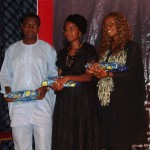
He walked into the African Voice offices looking ever so unassuming about anything in sight. Everything was meant to be new and, indeed, new to him – that was his first visit to the tabloid’s office and I was to receive him. He was early, I was late. We soon got over the apologies and pleasantries and settled into the office. It was not too long ago that I saw him and we talked about a lot of things on the arts frontier. I was now the one who looked at him trying to match his simple mien. I had read his latest and award winning book, Tenants of the House, and I thought I could see through his eyes and his hidden thoughts as well. But I was disarmed.
He sank into a chair and took a nice cuppa for a warmer. I was going to start our interview discussion with his book but then changed my mind as Nigeria had recently lost a colossus in Achebe whose latest work, There was a Country, also crossed the threshold of the Nigerian political terrain. My decision found a bit of justice in the fact that Dr. Wale Okediran is both a politician and a novelist on note. So I went down the Achebe review lane.
Asked about the writer Achebe, he pointed out that Achebe should be seen as a pioneer of African literature in English but would not know why Achebe would not accept himself as a father of African literature; perhaps out of modesty. This he said could be because Achebe had had a scholarship to study the medical sciences but changed to humanities in line with a focus and vision. If setting the records straight was a motive, Achebe did not anticipate that Things Fall Apart, written at the age of 28 years, was going to be a global success. Okediran thus saw Achebe as a dedicated writer against the controversies which his latest work There was a Country was generating. He saw this as proof of Achebe being one of the best minds of African literature.
If that is so, then why did Achebe not achieve being a Nobel laureate? Okediran advised writers not to base proficiency in writing on prizes won. It is important in itself to write and communicate and have followership. Prizes are icing on the cake and may not necessarily be an ambition. He pointed out that judges of (the) awards may be subjective in an exercise as Achebe’s experiences in being shortlisted several times show innocuous considerations in the selection processes. He added that this should not be a distraction as it is enough to be a successful writer; prize being secondary. He opined that prizes is usually based on an overall consideration of factors and not on one sole factor or what semblances are achieved in social life, like it was said that Soyinka was recognized because of his political activism. He objected to such a statement attributed to Sam Omatseye that ‘Achebe was a good story-teller, so was my grandmother’. Okediran then advised up-coming writers to script good stories, poetry, etc and if prizes come on account of them they should be celebrated. However, the major duty of a writer is to write good books and not chase prizes.
At this point, and speaking for writers in Africa and African writers in diaspora, I asked him if it was viable to write for the sake of it or look to writing as a means of sustenance. His response noted that this was an age-old battle and whether a work is of a serious/unserious nature, a good work of art should be able to achieve both contexts. This, he stated, Things Fall Apart did. He noted that Achebe tried to answer the question of the Nigerian state from a cultural point of view but where western influences are factored into the focal realization of the context, the western point of view is upheld at the expense of the cultural one. Again, he mentioned the strong ideological direction that Achebe’s work had – the need to match Africanism with western ideology; and the presence of the quintessential fabric of humour, drama, morale, etc that made the work readily adaptable for stage. This was a successful marriage of the creative and commercial qualities. He looked at what the comparison for success from both cultures would be and asked if the world was ready for African literary works.
Using Achebe’s renowned work to illustrate his point, he noted that Conrad’s reference to ‘the dark continent’ was a chief motivation for the late writer to write his story. If the world is not ready for the African writer, then the African writer is obliged to make the world listen. Finding voice for the African writer was achieved by the Heinemann educational Books (HEB) and thus the purpose of the African Writers Series (AWS) where Achebe also held office. Okediran , who is also a medical doctor, in accounting for his tenure as a national president of the Association of Nigerian Authors (ANA) explained that the need to pursue this goal made him liaise with other international writers group like the Pan African Writers association (Ghana), the African Movement for Artistes, Belgium and also the Norwegian Writers Association in Hounslow. He travelled to Zimbabwe and members also were in Frankfurt and attended the London Book Fair to promote authors.
In pre-empting my next line of question, the discussion drifted to his contributions and he was enthused to state as his drive. Personally, starting out with a few friends, Dr. Okediran instituted the Ebedi Writers Residency to provide for writers seeking such abroad and stop the drift. The residency now enjoys patronage from all over Africa. Noting that it was necessary that corporate support could help African writers even further, he added that he got support of Arik Air in February, 2013 to sponsor the promotion of his latest book to Cincinnati, Ohio, New York, Florida, Philadelphia and Atlanta, Georgia. He stated these were efforts to let the world realize that African literature is alive. Writers should not believe that the world owes them anything. He gave examples of writers like J.P. Clark, Cyprian Ekwensi, etc who were contemporaries, if not older than Achebe but may be said not to have been adequately recognized as he. Fame is said to be fickle but the main issue is to write and communicate.
On a related note, I then asked if the technology advantaged social media to hype a work was not likely to sacrifice the merit of it. He said the advent of the social media was good and that it afforded budding writers an avenue to showcase their works in view of the constraints faced ordinarily to have their works in print. The social media is thus a viable alternative to these limitations. He stated that there are many writers seeking publishing outlets that would take care of their costs but when that is not there resort to self-publishing with the challenge of distribution. The social media helps them out. But he noted other challenges e.g. power failure, improper editing, and young writers seeking short cuts and thus circumventing appropriate processes. Copyright also becomes a bane for on-line publications leading to stolen works and plagiarism. Nonetheless, these should be used by writers where necessary steps are taken to ensure protection of their works. In debunking the notion that only young writers suffer discouragement of rejection notes, he pointed out quite a number of established writers also got the same. The Godfather manuscript by Mario Puzo was rejected over 15 times. He said rejection notes should be seen as a process. I like to make references to young ones who should keep on writing. They should do their best to get published properly whether in or out of the country (Nigeria). He further observed that writers can be arrogant and want to reject all criticisms of their works. Some of these, consequently, do vanity publishing perhaps to the detriment of good editorial procedure to their works.
Should arrogance be a trait of a writer?
Every writer needs a bit of arrogance. It is a lonely job. These were his immediate response. He further noted that, in Nigeria, the reading culture is still poor, and the love of literature is not strong enough. A writer needs drive to preach against the odds, social disturbance and therefore the possibility or need to defy some norms. Notwithstanding these, the writer is to note his limitations; like a doctor who has to defer to another when he is ill and not take things into his own hand. While the 1990s had the active presence of the Evans Publishers, Spectrum Publishers, etc who had established editors to support new works which is not so anymore. The role of the editor is so quintessential to a work that he made reference to an editor who edited the works of five nobel laureates. This feat he attributed to that editor’s responsibility to ‘panel beat’ the works for success. Also mentioned was Biyi Bandele who acknowledged his editor’s input to the success of his work.
He however, pointed out that the differences between ours (Nigerian) and other international writers is the editorial intervention. Writing is the skill; re-writing is the real work. Upcoming writers should not take criticism personally e.g. Tenants of the House was edited by six people making it about five times better than the original script. It is important that authors take into consideration criticisms by editors. But because of the dearth of publishing houses, authors are at the mercy of roadside publishers.
Asked about the major thematic treatise between Things Fall Apart and There was a Country, Dr. Okediran remarked that every writer reflects his/her contemporary concerns in themes. This has affected what Achebe has written and that includes influences of his own background and medical up-bringing. It is therefore not far-fetched that Achebe reflected his Igbo land and culture in TFA. He had witnessed the civil war, deaths and genocide, and so carried the story in his head for a while till he was able tpo bring it out which people take for a collection of essays. He asked that Achebe should not be begrudges as he would have written in similar lines if he had an armed robbery. This would affect how he relates the story which would differ from others. In my account of Tenants of the House I wrote from the point of view of a politician who was in opposition in the Nigerian national assembly and my colleagues didn’t like the way it was written but that is to be expected. He reflected that many were against the third term agenda of the then Nigerian president, Chief Olusegun Obasanjo, and sympathized with the writing. Some may say what I have written is wrong. However, he added the former President used to say that ‘if anyone thinks so, write your own’. If therefore Achebe’s latest work ruffled a few feathers that is to be expected. It is impossible to write such a work without attracting such flaks. He opined that if his book, Tenants of the House was in non-fiction, he would have been in a lot of trouble. Achebe wrote his as a catharsis to purge his emotion.








